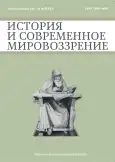Attitude of the US Congress to the Nuclear Disarmament of Kazakhstan (1991-2001)
- 作者: Alexandrov S.N.1,2
-
隶属关系:
- National Research Tomsk State University
- Tomsk State University of Control Systems and Radio Electronics
- 期: 卷 4, 编号 2 (2022)
- 页面: 119-131
- 栏目: Articles
- URL: https://bakhtiniada.ru/2658-4654/article/view/147234
- ID: 147234
如何引用文章
全文:
详细
作者简介
Stanislav Alexandrov
National Research Tomsk State University; Tomsk State University of Control Systems and Radio Electronics
Email: gaarane91@mail.ru
postgraduate student, senior lecturer Tomsk, Russian Federation
参考
- Bajzakova K.I., Kukeeva F.T., ZHigalov K.V. Western vector of Kazakhstan's foreign policy: state and prospects. Series of International Relations and International Law. Almaty. No. 4(96). Pp. 8-14. (In Russ.)
- Azerbaev S.G., Umgaev S.A. Nuclear disarmament of Kazakhstan and generality in this matter with African countries. Bulletin of KalmSU. Elista. 2021. No. 1(49). Pp. 6-15. (In Russ.)]
- Karakaev S.V. Maintaining the potential of strategic missile forces after the collapse of the Soviet Union. Military thought. Moscow. 2021. No. 9. Pp. 125-132. (In Russ.)
- Aleksandrov S.N. Nuclear disarmament of Kazakhstan as a US interest (1990s). Issues of history, archeology, political science and regional studies: a collection of materials of the XV All-Russian (with international participation) scientific conference of students, master's students, graduate students and young scientists. Tomsk, 2019, Pp. 269-272 (In Russ.)
- Aleksandrov N.D. Problems of nuclear disarmament and participation of the Republic of Kazakhstan in their resolution in the context of international security. Bulletin of the Kazakh-American Free University. Ust-Kamenogorsk. 2018. No. 4. Pp. 152-156. (In Russ.)
- Macyuk D.A. Kazakhstan experience in nuclear disarmament. International Journal of Information and Communication Technologies. Paris. 2022. Special issue. Pp. 117-123. (In Russ.)
- Muratshina K.G. Post-Soviet Central Asian states’ policies towards the Treaty on the Prohibition of Nuclear Weapons. Administrative consulting. Yekaterinburg. 2019. No. 11. Pp. 47-56. (In Russ.)
- Ivatova L.M., Ordabek E.A. Contribution of the President of Kazakhstan to ensuring nuclear safety in the context of globalization. First President of the Republic of Kazakhstan - Elbasy: strategy of public administration and the phenomenon of leadership: a collection of materials of the international scientific and practical conference, Almaty, November 11, 2017. Astana, 2018, Pp. 138-146 (In Russ.)
- Velichkov K.S. Kazakhstan’s nuclear governance as a foreign policy asset. NNC RK Bulletin. Kurchatov. 2021 No. 3. Pp. 21-28. (In Russ.)
- Shenin S.Yu. «Nann-Lugar Program» and Nuclear Disarmament of Ukraine. Bulletin of VolSU. Volgograd. 2020. No. 3. Pp. 103-114. (In Russ.)
- Chihichin Yu.S. Approaches of the administrations of J. Bush and W. Clinton to the problem of nuclear disarmament of Ukraine in the period 1992-1996. News of Saratov University. New series. Series: History. International relations. Saratov. 2020. No. 2. Pp. 221-226. (In Russ.)
- Chernega V.N. France's nuclear arsenal and its approaches to non-proliferation and the prohibition of nuclear weapons. St. Petersburg. 2020. No. 3. Pp. 94-117. (In Russ.)
- Rumyancev V.P. «David and Goliath»: D. Ben-Gurion and disagreements with the United States on the issue of Israel's nuclear program, 1960-1963. Bulletin of TSU. Tomsk. 2020. No. 64. Pp. 78-84. (In Russ.)
- Taubman P. Cold War soldiers. Moscow, 2016. P. 608 (In Russ.)
- Baranova N.S, Vetlugina A.E. International Legal Control of the Non-Proliferation Regime. Act and Law. Moscow. 2021. No. 7. Pp. 154-158. (In Russ.)
补充文件








